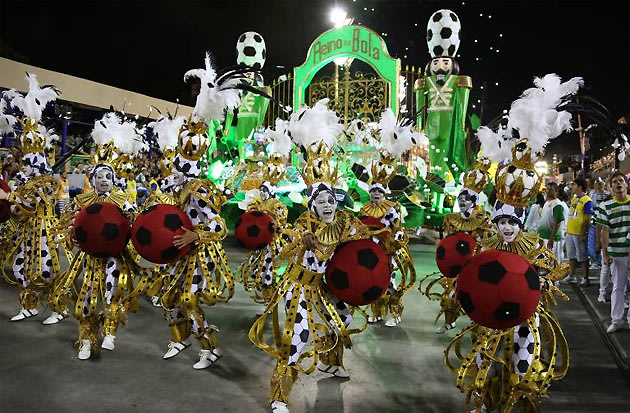Beautiful game makes way for beautiful people at Carnaval
It is Carnaval season. Even if you knew nothing about Brazil’s calendar, you’d find it hard to avoid; you cannot look at one of the country’s newspapers or websites without being carpet-bombed with images of celebrities dressed, depending on gender, either in a handful of sequins and feathers or in the garish baggy shirts that serve as the festival’s de facto male uniform.
As befitting this celebration of the pleasures of the flesh (the word Carnaval itself shares its genes with carnality, carnivores and so on), many of the country’s footballers take the chance to cut loose from the daily grind and don their party shoes, profiting from a brief hiatus in the state championships.
(It might, of course, seem a little inadvisable to have a fortnight off given the pitfalls of Brazil’s football schedule - especially in this of all years - but working through Carnaval is almost unthinkable for vast swathes of the general public.)
For some of them, like Ronaldinho, this is probably the best week of the year. The veteran is usually found desfilando (marching in an organised parade) with one samba school or another, lapping up the atmosphere in, for example, a white suit and sambista hat. Old toothy was certainly out in force this year, taking to the stage to perform with rapper Edcity in the legendary Bahia Carnaval.
His exploits will be monitored closely by the baying media over the next few days, not least because both he and Atlético Mineiro team-mate Diego Tardelli have already picked up their first fines of the season for turning up late to training over the weekend. With Jô also on the books and the eternally lively Emerson Sheik rumoured to be a transfer target, the Galo are slowly becoming something of an enclave for Brazilian football’s most legendary partygoers.

One man who you imagine would love to join them has been conspicuous by his absence at festivities: Adriano. The striker loves a cerveja and a hot dog as much as (read: a lot more than) the next guy, but has spent the last few days stepping up attempts at a career revival with Atlético-PR, whose, er, PR department is presumably enjoying the chance to dine out on photos of the troubled star working his socks off in training.
Despite the obvious friction between sporting performance and nocturnal excess, Carnaval and futebol are in many ways kindred. Both, it seems to me, play – or at least have played – a similar role in Brazil’s national psyche, inuring the population to the hardships of everyday life with the promise of escape. Carnaval may only come around once a year, but people prepare for it for months; football matches allow for the same anticipation on a smaller scale, but more often.
This thought has become particularly relevant in the last year, with Brazilians now taking to the streets for the first time in decades to protest a range of social ills. Even the World Cup has had no sedative effect, rather becoming a channelling rod for understandable ire at poorly-thought-out public spending and endemic political corruption.
There is a sense that, in 2014, even the outré, trip-down-the-rabbit-hole joy of Carnaval will not distract a population bent on change. This may be a country well versed in the psychology of Mass Forgetting, but even the most accepting of citizens have a limit.

No comments:
Post a Comment